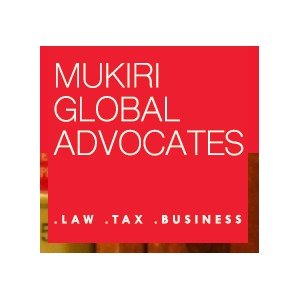Best International Trade Law Lawyers in Kenya
Share your needs with us, get contacted by law firms.
Free. Takes 2 min.
Or refine your search by selecting a city:
List of the best lawyers in Kenya
Legal guides written by Adroit Law LLP:
- Kenya Launches Digital Nomad Visa: A Gateway for Remote Workers
- Navigating the Payment System License Maze in Kenya
- Navigating the Complexities of Mining Licenses and Permits in Kenya: A Look into Artisanal and Large-Scale Operations
About International Trade Law in Kenya
International Trade Law in Kenya encompasses the regulations and laws that govern the exchange of goods, services, and capital across international borders. As a member of the World Trade Organization (WTO) and regional trade blocs like the East African Community (EAC) and the Common Market for Eastern and Southern Africa (COMESA), Kenya adheres to international agreements and has developed local laws to facilitate trade, promote economic development, and ensure compliance with global standards.
Why You May Need a Lawyer
Engaging in international trade can present complex legal challenges, making it advisable to seek legal assistance in certain situations:
- Contract negotiation and drafting: Lawyers can help draft contracts to ensure compliance with Kenyan and international trade laws.
- Dispute resolution: Legal experts can represent you in resolving disputes arising from international trade transactions.
- Customs and compliance issues: Navigating the customs regulations and ensuring compliance with trade laws often require expert legal advice.
- Intellectual property protection: Protecting your IP rights in international markets is crucial and may require legal intervention.
- Mergers and acquisitions: Legal advice is often necessary when dealing with cross-border investment plans.
Local Laws Overview
Several local laws are relevant to International Trade Law in Kenya:
- The East African Community Customs Management Act: Governs customs duties and procedures within the EAC member states.
- Kenya's Export Promotion and Investment Act: Regulates foreign investments and promotes exports.
- The Anti-Counterfeit Act: Aims to combat counterfeit goods and protect intellectual property rights.
- The Competition Act: Ensures fair competition in the trade sector.
- The Consumer Protection Act: Protects the interests and rights of consumers in trade transactions.
Frequently Asked Questions
What is International Trade Law?
International Trade Law is a body of laws and regulations that govern the trade of goods and services across international borders, encompassing aspects like customs, tariffs, and trade agreements.
Why is it important to consult a lawyer for international trade issues?
Lawyers have the expertise required to navigate complex regulations, protect your interests, ensure compliance, and handle disputes effectively.
How does Kenya benefit from international trade agreements?
Trade agreements help Kenya by expanding markets for its goods, enhancing economic growth, and encouraging foreign investments.
What are the penalties for non-compliance with trade laws in Kenya?
Penalties may include fines, confiscation of goods, and potential legal action against the parties involved, depending on the severity of the non-compliance.
What is the role of the Kenyan government in international trade?
The government facilitates trade through policy formulation, building infrastructure, and enforcing compliance with international trade laws and agreements.
What should I consider when drafting an international trade contract?
Key considerations include jurisdiction, dispute resolution mechanisms, compliance with relevant laws, terms of payment, and quality standards.
How does Kenya address intellectual property issues in international trade?
Kenya enforces IP laws through the Anti-Counterfeit Agency to protect against IP theft in international trade.
Can international trade disputes be resolved within Kenya?
Yes, disputes can be resolved through arbitration, litigation, or alternative dispute resolutions like mediation within the framework of Kenyan law.
Are there specific licenses required for exporting goods from Kenya?
Yes, exporters must obtain necessary licenses and adhere to regulatory requirements set by government authorities.
How are customs duties determined in Kenya?
Customs duties are calculated based on the value of goods, their classification under the Harmonized System, and applicable regional agreements.
Additional Resources
To further assist those seeking legal advice in international trade, consider the following resources:
- Kenya Trade Network Agency (KenTrade): Facilitates trade through the Kenya National Electronic Single Window System.
- Kenya Revenue Authority (KRA): Oversees customs and tax regulations pertinent to trade.
- The East African Community (EAC): Provides information on regional trade laws and agreements.
- Kenya Export Promotion and Branding Agency (KEPROBA): Promotes and assists in trade development.
Next Steps
If you require legal assistance in International Trade Law in Kenya, consider the following steps:
- Identify your legal needs: Clearly outline the specific trade issue you are facing.
- Research experienced lawyers: Look for attorneys who specialize in International Trade Law with local and international experience.
- Consultations: Schedule meetings with potential lawyers to discuss your case and understand their approach.
- Evaluate the lawyer's expertise: Consider their track record and familiarity with trade laws affecting your sector.
- Engage a lawyer: Once satisfied, formally engage a lawyer to assist you with your trade law needs.
Lawzana helps you find the best lawyers and law firms in Kenya through a curated and pre-screened list of qualified legal professionals. Our platform offers rankings and detailed profiles of attorneys and law firms, allowing you to compare based on practice areas, including International Trade Law, experience, and client feedback.
Each profile includes a description of the firm's areas of practice, client reviews, team members and partners, year of establishment, spoken languages, office locations, contact information, social media presence, and any published articles or resources. Most firms on our platform speak English and are experienced in both local and international legal matters.
Get a quote from top-rated law firms in Kenya — quickly, securely, and without unnecessary hassle.
Disclaimer:
The information provided on this page is for general informational purposes only and does not constitute legal advice. While we strive to ensure the accuracy and relevance of the content, legal information may change over time, and interpretations of the law can vary. You should always consult with a qualified legal professional for advice specific to your situation.
We disclaim all liability for actions taken or not taken based on the content of this page. If you believe any information is incorrect or outdated, please contact us, and we will review and update it where appropriate.
Browse international trade law law firms by city in Kenya
Refine your search by selecting a city.

















